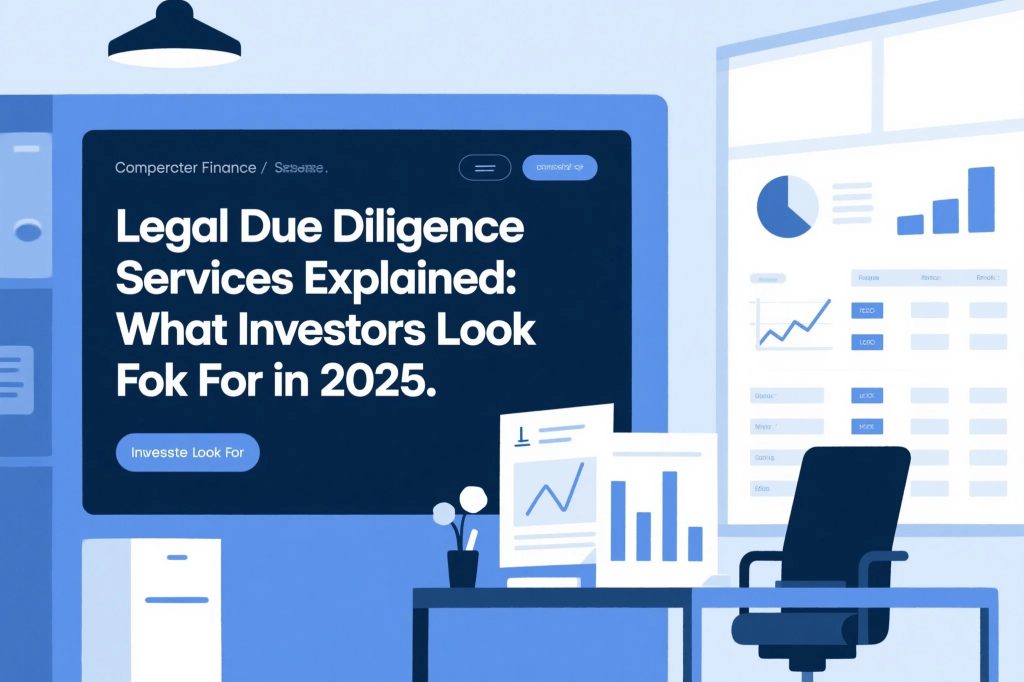The Evolution of Legal Due Diligence in Modern Investing
The landscape of legal due diligence services has undergone radical transformation as we enter 2025, driven by technological advancements, regulatory complexity, and investor demand for deeper risk assessment. What was once a routine checkbox exercise has become a sophisticated investigative process that often makes or deals. Today’s investors approach due diligence with forensic intensity, examining not just current compliance but future-proofing against emerging legal risks that could impact long-term returns. This shift reflects hard lessons from recent high-profile investment failures where overlooked legal issues destroyed significant value.
Modern due diligence now integrates traditional document review with advanced analytics, AI-assisted pattern recognition, and predictive risk modeling. Sophisticated investors expect their legal counsel for businesses to provide not just snapshots of current status but forward-looking assessments of regulatory exposure and litigation probability. This evolution has made due diligence less about avoiding bad deals and more about identifying opportunities to enhance value through legal optimization. The most sought-after due diligence teams now function as strategic partners rather than just risk identifiers.
The globalization of investment opportunities has added layers of complexity to due diligence processes. Cross-border transactions require harmonized review frameworks that account for varying legal systems, cultural business practices, and geopolitical risks. Investors increasingly demand integrated legal risk management strategies that address these multinational complexities while maintaining consistent standards across their portfolios. This global perspective has become particularly crucial in sectors like technology, energy, and healthcare where regulatory environments differ dramatically across markets.
Core Components of a 2025 Due Diligence Framework
Corporate structure and governance analysis forms the foundation of any thorough due diligence process. Investors scrutinize business incorporation legalities to verify proper formation, maintenance of corporate formalities, and adherence to jurisdictional requirements. This review extends beyond basic documents to assess whether the company’s actual governance practices align with its formal structure. Red flags like commingled assets, undocumented related-party transactions, or inconsistent record-keeping often prompt deeper investigation into potential liability issues.
Contractual ecosystems now receive unprecedented scrutiny during due diligence. Modern legal due diligence services employ specialized software to map contractual relationships, identify unusual terms, and flag potential risks across hundreds or thousands of agreements. Investors particularly focus on change-of-control provisions, termination rights, and liability limitations that could impact post-transaction operations. The most thorough reviews include analysis of contract performance history to identify patterns of disputes or non-compliance that might indicate systemic issues.
Intellectual property due diligence has expanded far beyond simple ownership verification. Investors now demand comprehensive audits of protection strategies, freedom-to-operate analyses, and assessments of trade secret safeguards. For technology companies, this includes scrutiny of open-source software usage, patent quality assessments, and evaluations of development processes. These IP reviews often require specialized legal counsel for businesses with technical expertise in the relevant industry to properly evaluate both current assets and future risks.
The Due Diligence Checklist Revolution
Standardized legal audit checklist approaches have given way to dynamic, AI-powered due diligence frameworks that adapt to each deal’s unique characteristics. Modern checklists automatically prioritize review areas based on initial findings, industry risks, and deal structure. This intelligent approach allows due diligence teams to focus resources where they matter most while maintaining comprehensive coverage. Investors particularly value these adaptive systems for their ability to surface non-obvious risks that traditional linear checklists might miss.
Regulatory compliance review has become one of the most checklist-intensive due diligence areas. A thorough legal audit checklist for compliance must address industry-specific regulations, data privacy laws, employment standards, environmental requirements, and international trade rules. The most effective checklists incorporate jurisdiction-specific nuances and recent enforcement trends to identify areas of heightened risk. This regulatory mapping proves particularly valuable for private equity firms evaluating platform companies that may pursue add-on acquisitions in new markets.
Employment and labor due diligence now extends far beyond basic HR documentation. Investors examine organizational structures, compensation systems, employee classification practices, and benefits administration through both legal and cultural lenses. This holistic approach to workforce due diligence helps identify not just compliance risks but also organizational strengths and weaknesses that could impact post-transaction integration. Sophisticated legal risk management in this area considers everything from pending labor disputes to workplace culture metrics.

Technology’s Transformative Impact on Due Diligence
Artificial intelligence has revolutionized legal due diligence services by enabling analysis of previously unmanageable data volumes. Natural language processing tools can review thousands of contracts in multiple languages, flagging anomalies and extracting key terms with superhuman speed and consistency. Machine learning algorithms identify patterns across documents that might indicate systemic issues or opportunities. These technologies don’t replace human judgment but rather augment it, allowing due diligence teams to focus on strategic assessment rather than manual document review.
Blockchain verification tools are transforming authenticity confirmation in due diligence processes. Smart contracts can automatically verify corporate records, IP ownership chains, and regulatory filings against immutable distributed ledgers. This technological advancement significantly reduces the time traditionally spent validating document authenticity while increasing confidence in due diligence findings. For investors considering deals involving digital assets or blockchain-native businesses, these verification capabilities have become essential components of legal risk management.
Virtual data rooms have evolved into sophisticated deal management platforms that facilitate collaborative due diligence across global teams. Modern systems offer AI-powered organization, advanced analytics, and real-time collaboration features that streamline the review process. These platforms integrate with legal audit checklist systems to ensure comprehensive coverage while providing investors with transparent progress tracking. The best systems also include post-closing functionality that helps acquirers manage integration of due diligence findings into ongoing compliance programs.
Sector-Specific Due Diligence Priorities
Technology investments demand specialized due diligence focusing on intellectual property, data assets, and regulatory compliance. legal due diligence services for tech deals typically include code audits, data privacy assessments, and reviews of technology development processes. Investors pay particular attention to open-source software usage, AI training data provenance, and cybersecurity protocols. These technical reviews require close collaboration between legal teams and subject matter experts to properly evaluate both current status and future risks.
Healthcare and life science due diligence has become increasingly complex with evolving regulatory landscapes. Reviews must address clinical trial compliance, FDA approval processes, healthcare fraud and abuse laws, and international regulatory variances. Sophisticated investors engage legal counsel for businesses with specific healthcare expertise to navigate these specialized requirements. Particular attention goes to reimbursement systems, provider arrangements, and patient data handling practices that could create significant liability if improperly structured.
Manufacturing and industrial sector due diligence now emphasizes supply chain resilience and environmental compliance. Investors examine not just a company’s own operations but its vendor networks and distribution channels for potential risks. This extended due diligence approach reflects lessons from recent global disruptions that revealed vulnerabilities in lean inventory systems and single-source dependencies. Comprehensive legal risk management in this sector includes analysis of environmental liabilities, product safety protocols, and international trade compliance.
Emerging Areas of Due Diligence Focus
ESG (Environmental, Social, and Governance) factors have moved from nice-to-have considerations to core due diligence requirements. Modern legal audit checklist frameworks include comprehensive ESG assessments that evaluate climate risk exposure, diversity and inclusion metrics, and corporate governance practices. Investors recognize that strong ESG performance correlates with reduced regulatory risk and enhanced long-term value creation. These assessments now influence deal terms and valuations as much as traditional financial metrics in many sectors.
Cybersecurity due diligence has expanded beyond basic policy reviews to include penetration testing, incident response capability assessments, and dark web monitoring. Investors understand that cyber risks can destroy value overnight, making thorough technical and legal evaluation essential. Specialized legal due diligence services now collaborate with cybersecurity experts to provide integrated assessments that cover both current vulnerabilities and future-proofing strategies. This holistic approach is particularly crucial for deals involving sensitive customer data or critical infrastructure assets.
Artificial intelligence governance has emerged as a new due diligence frontier. Investors now evaluate how companies manage AI development, deployment, and monitoring to mitigate ethical and legal risks. This includes reviewing data sourcing practices, algorithmic bias controls, and compliance with emerging AI-specific regulations. For businesses incorporating AI into their products or operations, demonstrating robust business incorporation legalities for AI governance has become a competitive advantage in funding rounds and acquisitions.
Post-Diligence Integration and Value Creation
The most sophisticated investors view due diligence not as a deal hurdle but as the foundation for post-acquisition value creation. Modern legal due diligence services now include integration planning components that help acquirers operationalize their findings. This might involve designing compliance remediation programs, developing contract standardization initiatives, or creating post-close monitoring systems. By bridging the gap between deal assessment and operational implementation, these services help investors realize the full potential of their acquisitions.
Risk-based prioritization frameworks help investors focus post-acquisition resources where they’re needed most. The most effective due diligence processes categorize findings by both severity and remediability, creating clear roadmaps for addressing identified issues. This structured approach to legal risk management ensures that critical vulnerabilities receive immediate attention while less urgent matters follow appropriate timelines. Investors increasingly demand these prioritization matrices as deliverables from their due diligence providers.
Knowledge preservation systems ensure due diligence insights continue creating value long after deal closing. Forward-thinking investors institutionalize findings through integrated legal audit checklist systems that inform ongoing compliance monitoring and risk assessment. These living systems help portfolio companies maintain diligence standards while providing investors with visibility into risk mitigation progress. The most advanced platforms even use machine learning to identify patterns across multiple deals, enhancing an investor’s ability to spot risks in future opportunities.
Selecting and Managing Due Diligence Providers
Choosing the right legal counsel for businesses for due diligence requires careful evaluation beyond just legal expertise. Investors should assess a provider’s industry knowledge, technological capabilities, and ability to deliver strategic insights alongside risk identification. The best due diligence teams combine deep legal acumen with business sophistication, understanding how to balance risk avoidance with opportunity capture. Portfolio references and case studies often provide the clearest picture of a provider’s true capabilities.
Effective management of due diligence processes has become a specialized skill in itself. Investors should establish clear scoping documents, communication protocols, and decision-making frameworks before engaging legal due diligence services. Regular milestone check-ins and real-time issue escalation processes help keep complex reviews on track. The most successful engagements maintain flexibility to adapt as new information emerges while staying focused on the investor’s core objectives and risk tolerance.
Performance metrics for due diligence providers should extend beyond basic deliverables. Savvy investors track factors like issue detection rates, false positive ratios, and the eventual materiality of identified risks. These metrics help refine provider selection and engagement strategies over time. Some forward-looking firms even evaluate how well due diligence findings predicted post-acquisition challenges, creating continuous improvement loops that enhance future deal success.





